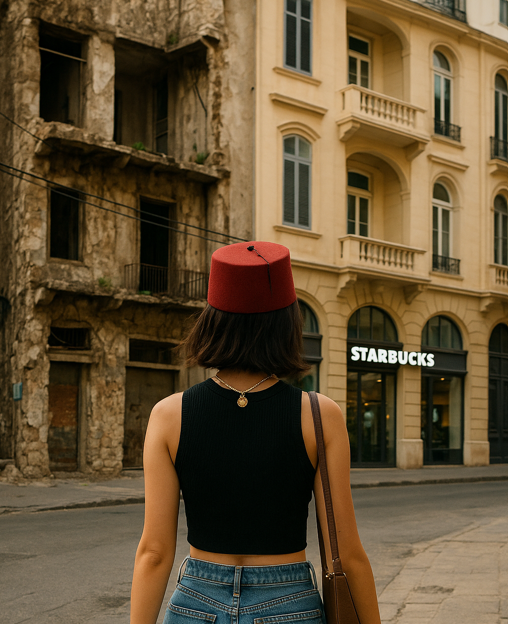
And sectarianism was never our real issue; it’s this fractured identity, this existential crisis that goes beyond narratives and narrow affiliations.
Frantz Fanon describes this beautifully: the post-colonial hangover. We, as colonized societies, internalize the supposed superiority of our colonizers. I can see it: an obsession with the West—speak like the French, dress like the Americans, and crave validation and belonging from the Europeans—the same ones we gave their name to here in Tyre. An identity deeply tied to the cultures we now try to emulate.
Let me put it that way: we copy Western culture but never fully belong to it. We’re stuck between tradition and modern life, between wanting Western systems but rejecting Western critiques (human rights, feminism, etc.). Homi Bhaba's concept of mimicry: you imitate the colonizer, never become them.
You are less. Until they find the “Mediterranean diet,” until zaatar becomes a wellness trend, Drake samples Arabic beats, and Beyoncé dances to Dabke rhythms. You are less until “oriental chic” walks the runways in Paris, until Bella Hadid makes your eyebrows editorial, and your “tacky” gold shows up in Vogue. You are less until your culture is no longer yours.
And your marker of social class? Speak fluent French, like a Phoenician in Saifi. It’s how you “other” the less Westernized, the ones who still say “ahlein” instead of “bonjour”. Pierre Bourdieu called it cultural capital: using taste, language, and aesthetics to assert power and superiority. In simple words, “mes chers”, you are Lebanese in Lebanon living like elites in LA.
All of this made our biggest dream in this country to leave it. We romanticize the West, escape chaos, and once we get there, the same old inferiority complex hits again.
Remember the “Mediterranean diet”? The “tacky” gold now featured in Vogue? It hits again. That same weight of invisibility, of racism, of not quite belonging anywhere, the grief of a generation that never felt seen or safe in its own country, tried to find home in a place it worshiped, only to realize it wasn’t a culture to belong to, just a system that functions.
Electricity. Water. Human dignity.
The tragic trinity of the Lebanese complex.
My first theory is this: we are not just sectarians or a bunch of racists; we're trapped in this loop of an identity crisis that dictates our generations. A single day can mean a triumph of victory for some and grief for others—a bitter reminder of who belongs and who doesn't. This is not a division of religion or politics; this is the core of our identity. My second theory? Even darker. Our desperate Westernization is our only survival mechanism, our only way of rebranding ourselves, masking the failures of a broken system that broke us. It is an act of denial, a fragile attempt to stay sane in a country where belonging is fragmented and identity is conditional. We clutch onto their ideals because, well, they promise an escape―an escape from chaos, from history, from our cycle. And maybe, just maybe, there's a little resilience in that.